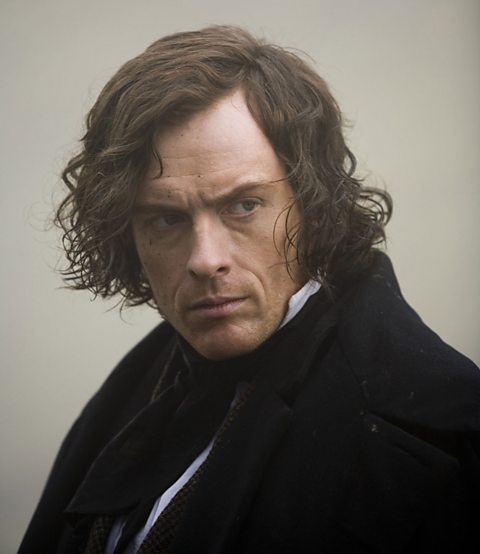Edward Rochester in Jane Eyre
Edward Rochester is the master of Thornfield Hall and as a consequence, has a large fortune. Brontë describes Rochester as aloof, intelligent, rugged and witty. The reader first meets him when he falls off his horse, accusing Jane of bewitching it. From the beginning, we get the impression that Rochester is aloof, wild and outspoken. Rochester demands that Jane spends time with him, and they spend their evenings arguing and discussing topical issues. His rugged appearance makes him appear wilder, echoing his personality. Jane begins to fall in love with him.

Rochester organises a party, welcoming guests into his house. He flirts with Blanche Ingram, wanting Jane to become jealous and declare her love for him. When she doesn't, he appears angry and flirts all the more - manipulating Jane's and Blanche's emotions. Rochester finally declares his love for Jane, stating they must get married straight away. When, at the altar, it is revealed that Rochester is already married, he becomes angry and self-pitying as he is bound to Bertha, a 'mad-woman' who Brontë describes as being no longer human and animal-like. He wants Jane to stay with him, selfishly pleading to her and declaring his love. She leaves him.
When Jane returns to Rochester, she discovers that Rochester lost his sight and Thornfield Hall during a fire that Bertha caused. He repents for his past actions and puts others' safety before his own, becoming a true hero. He cries when he hears Jane's voice, demonstrating his true love for Jane.
| How is Rochester like this? | Evidence | Analysis | |
| Self-pitying | Rochester pities himself as he was forced into a marriage he did not want by his father. He pities the fact that he is married to Bertha. | "You shall see what sort of a being I was cheated into espousing, and judge whether or not I had a right to break the compact, and seek sympathy with something at least human." | Rochester is angry and self-pitying when he mentions his marriage to Bertha. The use of the verb 'cheated' illustrates how Rochester believes he was tricked into marriage and cheated out of happiness. He also refers to Bertha as a 'being', suggesting that she is less than human. |
| Manipulating | Rochester tries to manipulate Jane's emotions by flirting with Blanche Ingram and making Jane believe that they are going to marry. | "Well, tonight I excuse you; but understand that so long as my visitors stay, I expect you to appear in the drawing room every evening; it is my wish, don't neglect it." | Rochester is demanding that Jane spends time in the drawing room with his guests and himself. During Jane's time in the drawing room, she has to witness Blanche's flirting with Rochester. This shows that Rochester is trying to make Jane jealous so she will confess her love to Rochester. |
| Self-pitying | |
|---|---|
| How is Rochester like this? | Rochester pities himself as he was forced into a marriage he did not want by his father. He pities the fact that he is married to Bertha. |
| Evidence | "You shall see what sort of a being I was cheated into espousing, and judge whether or not I had a right to break the compact, and seek sympathy with something at least human." |
| Analysis | Rochester is angry and self-pitying when he mentions his marriage to Bertha. The use of the verb 'cheated' illustrates how Rochester believes he was tricked into marriage and cheated out of happiness. He also refers to Bertha as a 'being', suggesting that she is less than human. |
| Manipulating | |
|---|---|
| How is Rochester like this? | Rochester tries to manipulate Jane's emotions by flirting with Blanche Ingram and making Jane believe that they are going to marry. |
| Evidence | "Well, tonight I excuse you; but understand that so long as my visitors stay, I expect you to appear in the drawing room every evening; it is my wish, don't neglect it." |
| Analysis | Rochester is demanding that Jane spends time in the drawing room with his guests and himself. During Jane's time in the drawing room, she has to witness Blanche's flirting with Rochester. This shows that Rochester is trying to make Jane jealous so she will confess her love to Rochester. |
Question
At the end of the novel, Jane and Rochester are united as equals and marry one another. Why does Brontë end the novel this way?
- It relates to the bildungsroman form as Jane as finally achieved happiness in her adult life.
- It demonstrates Rochester's development as a human being - he learns to care for others and puts Jane first.
- It is a happy conclusion - the reader wants Jane and Rochester to be together.
Listen to a podcast about the characters of Mr Rochester and St John Rivers in Charlotte Brontë's novel, Jane Eyre.
Listen to the full series on ±«Óătv Sounds.